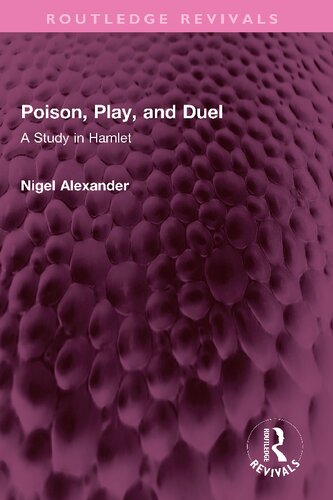

Most ebook files are in PDF format, so you can easily read them using various software such as Foxit Reader or directly on the Google Chrome browser.
Some ebook files are released by publishers in other formats such as .awz, .mobi, .epub, .fb2, etc. You may need to install specific software to read these formats on mobile/PC, such as Calibre.
Please read the tutorial at this link: https://ebookbell.com/faq
We offer FREE conversion to the popular formats you request; however, this may take some time. Therefore, right after payment, please email us, and we will try to provide the service as quickly as possible.
For some exceptional file formats or broken links (if any), please refrain from opening any disputes. Instead, email us first, and we will try to assist within a maximum of 6 hours.
EbookBell Team

5.0
80 reviewsFirst published in 1971, Poison, Play and Duel explores the dominant symbols of the language and action of Hamlet. The Ghost first reveals that Claudius murdered his brother by poison, and this act of poisoning is then dramatically presented before the King. The ultimate consequence of the ‘poison in jest’ performed by the actors is the poisoned ‘play’ with rapiers between Laertes and Hamlet. This representation of violence, and the vengeful response to violence, creates the moral and the psychological problems of Hamlet. Critics naturally question, and disagree about, the way that Hamlet plays his role in this play because the role of Hamlet is a theatrical device designed to bring all human actions into debate and question. It is hardly surprising that audiences have seen mirrored in Hamlet their own most fundamental and inescapable problems.
Nigel Alexander shows how Shakespeare, like Raphael, Titian and other Renaissance artists, developed and adapted the imagery inherited from the Christian and classical past. The battle within the soul, the choice of life, the hunt of passion, the triple face of prudence and the dance of the graces are given dramatic habitation in Hamlet’s soliloquies, in the inner-play and in the savage contrast of sexuality between Gertrude and Ophelia. This book will be of interest to students of literature, drama, psychology and philosophy.